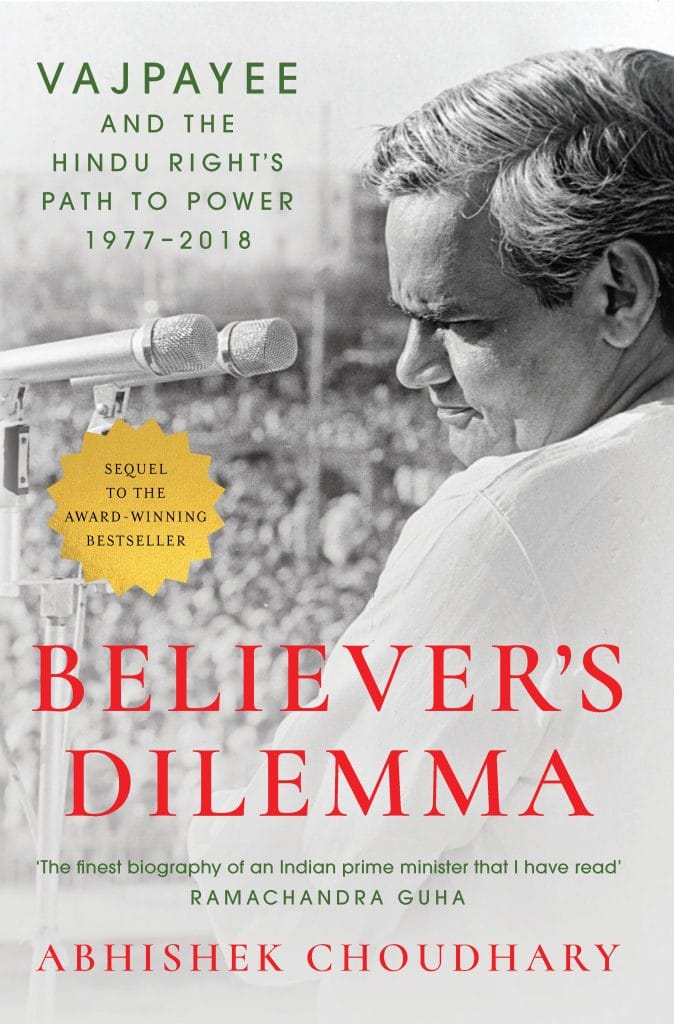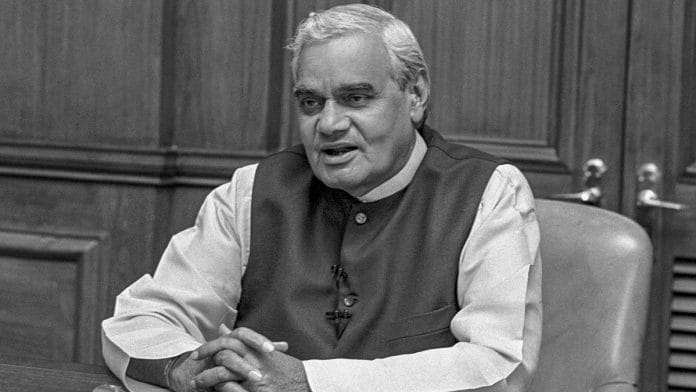Vajpayee had perfected the use of two excuses – obligations of health and parliamentary delegation – for taking a break from the drudgery of day-to-day politics. He had given much of the September 1993 Janadesh Yatra a miss, choosing instead to fly off on a delegation to Australia. Speech-making done, he was keen to have a good time. A bureaucrat travelling with him recalled:
After a hectic day of sightseeing, the delegation members were discussing the outcome of the conference, the trip in general and particularly the day’s experience in Sydney. Dinner over, while everybody was going to his room, Vajpayee whispered into my ear telling me to persuade the Speaker to retire to his room and relax. I was able to do so and escorted him back to his room. When I returned, Vajpayee, like a child, told me to organize a car which could take him, [Sikander] Bakht and me for another round of the city, to see it by night. We visited all the places that had charmed us, like Diamond Harbor. After a relaxed and memorable tour of the city, we moved back into our hotel rooms like disciplined children.
Old lieutenant Shivkumar accompanied him on a New York junket the next month. Done with the drab UNGA engagements, they visited the Grand Canyon and Disneyland. The leader of the opposition tried out rides with a childlike enthusiasm: ‘We stood in the queues for each and every ride. I don’t think I have ever seen him in such a jolly mood.’ He had become a nana – grandfather – three years ago, and Vajpayee’s rituals in New York now included picking up toys for his granddaughter Neha; and visiting a pet store to buy treats for his dogs. He also found time to relax with books, enjoying Vikram Seth’s fat new novel, A Suitable Boy, which he deemed ‘a brilliant work, the canvas … so large’ that it reminded him of the old classics.
It suited him to be placed on every important delegation that left India. So much so that there were jokes about the wily Narasimha Rao having co-opted him into a grand design, leaving him no time to guide his party. Rao lacked charisma but had acquired a knack for managing the contradictions of running a minority government with colleagues he could barely trust. Sending Vajpayee – with his long experience and encyclopaedic knowledge of external affairs – on delegations was one of his ways to control the chaos.
Some assignments were less fun and frolic than others. In March 1994, Rao trusted Vajpayee with one of the most significant diplomatic exercises of his term. This was in Geneva where, at the annual UN Human Rights Commission session, Pakistan was pushing to censure India on the ‘gross and consistent violations of the human rights of the people of Jammu and Kashmir’. If the resolution passed, it would be easy from there to internationalize the dispute.
Pakistan had whipped up such a resolution in the UN after thirty-three years. It hoped to swing international support from the post-Babri concerns about the safety of Muslims – Kashmiri Muslims in particular. Pakistan’s resolution was supported by the fourteen UNHCR members from the Organisation of Islamic Conference, and it was clear at the outset that a majority of the fifty-three UNHCR members would abstain.
Few noticed the irony of the situation: a man who had defended the demolition in Parliament, demanding Rao’s head, was now helping him weather its international fallouts. ‘People tell me that the foxy Rao had entrapped me,’ Vajpayee would later relish the joke at public ceremonies, ‘so in case Pakistan won he could blame me.’
In the past, when national prestige was at stake, delegations had been led by ministers. Even Nehru had never sent an opposition leader as the head of one. This multi-party delegation included popular faces: Finance Minister Manmohan Singh, junior Foreign Minister Salman Khurshid, even Farooq Abdullah – who had nodded and winked at the rigged election in 1988, and who, after being hounded out of office four years earlier, was living in London, desperately seeking a re-entry into Kashmir politics. His presence lent credibility and melodrama to the tense occasion.
Rao’s stratagem of sending the country’s most popular Sikh and Muslim faces to the delegation led by an opposition leader was to overwhelm its detractors. The message being: India is an innately secular, multi-party democracy where all shades of opinion (including those of Kashmiris demanding a modicum of autonomy) are encouraged. Manmohan Singh’s job was to politely remind the West of India’s economic potential – a veiled threat that by hitting India they would lose a huge market and hurt themselves.
If the Sikh finance minister spoke in a voice so soft that most people in the hall struggled to hear, Farooq’s thunder echoed well outside it. He cried, his eyed welled up, his body shook: ‘Over my dead body – she will come into Kashmir over my dead body, United Nations or no United Nations.’ He was referring to Benazir Bhutto, who had earlier likened Delhi’s repression in Kashmir to the ‘darkest days of the holocaust’. He had another punchline: ‘I will defend Kashmir with the last drop of my blood. You’ – the Pak-backed militants – ‘have turned my beautiful valley into a killing field.’
Vajpayee in private dubbed Farooq a ‘langoor’ – baboon – for his theatrics, and ‘refused to sit next to [him] rendering the Kashmir problem an excruciating one for the protocol-ridden diplomacy’. A solution was found: Vajpayee, who was an early riser, would head the morning sessions, Farooq, who preferred late starts, would take over the post-lunch sessions.
Vajpayee had a slight acquaintance with Benazir Bhutto. She had come to meet him when she visited Delhi to attend Rajiv Gandhi’s funeral, and he wondered why she was pressing for a resolution that went against the informal understanding her father had arrived at in Simla in 1972. Predictably, he spoke about the Pakistan-aided terrorism in the Valley, underplaying the violation of civil rights by the Indian security forces, arguing that the draconian Armed Forces (Special Powers) Act was used sparingly and only in disturbed areas. The Indians also arranged for a delegation from the other side of Kashmir, who argued that whereas Kashmiris had a modicum of autonomy on the Indian side, they had no roads or hospitals, no elections or freedom of expression.
If diplomacy is war by other means, for six long weeks, the border had moved to Geneva. India was struggling, and it seemed Team Vajpayee would narrowly lose. Vajpayee flew home for consultations, and air-dashed back to Geneva two days before the crucial vote. He sought permission for a fallback plan at Geneva: in case Pakistan succeeded, he would oppose the UNHRC’s decision to send a fact-finding mission to Kashmir. He had a copy of that statement prepared for the final day.
Miraculously, India was rescued by Iran. Foreign Minister Dinesh Singh made an emergency trip to Tehran, where his Chinese counterpart was also present. India beseeched Iran and China to abstain. He managed to impress on them both that India’s humiliation was only going to escalate tensions, with no tangible benefit for the other side. Significantly, the business house of Hindujas also chipped in. Vajpayee had built a friendship with the family since his Janata days (and on some occasions, the Geneva-based conglomerate’s family sent homemade food to Vajpayee’s suite). They were now asked to use their influence with Iran. Iran’s dissension confused other Muslim nations, forcing Pakistan to drop the resolution. The vote never took place.
Some speculated that ‘Shia Iran [was] settling a score with Sunni Pakistan and asserting its influence in the region’. But New Delhi declared itself victorious. The Indian delegation received the kind of grand welcome usually reserved for the national cricket team.
 This excerpt from Believer’s Dilemma: Vajpayee and the Hindu Right’s Path to Power 1977-2018 by Abhishek Choudhary has been published with permission from Pan Macmillan.
This excerpt from Believer’s Dilemma: Vajpayee and the Hindu Right’s Path to Power 1977-2018 by Abhishek Choudhary has been published with permission from Pan Macmillan.






